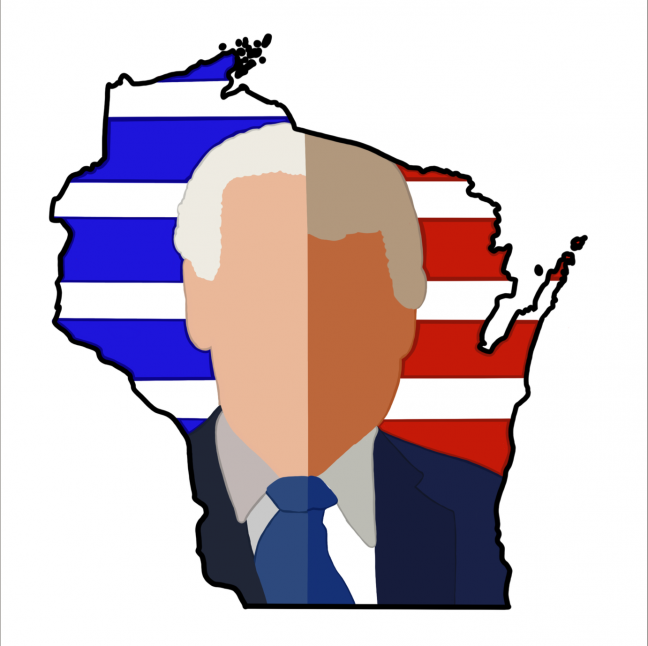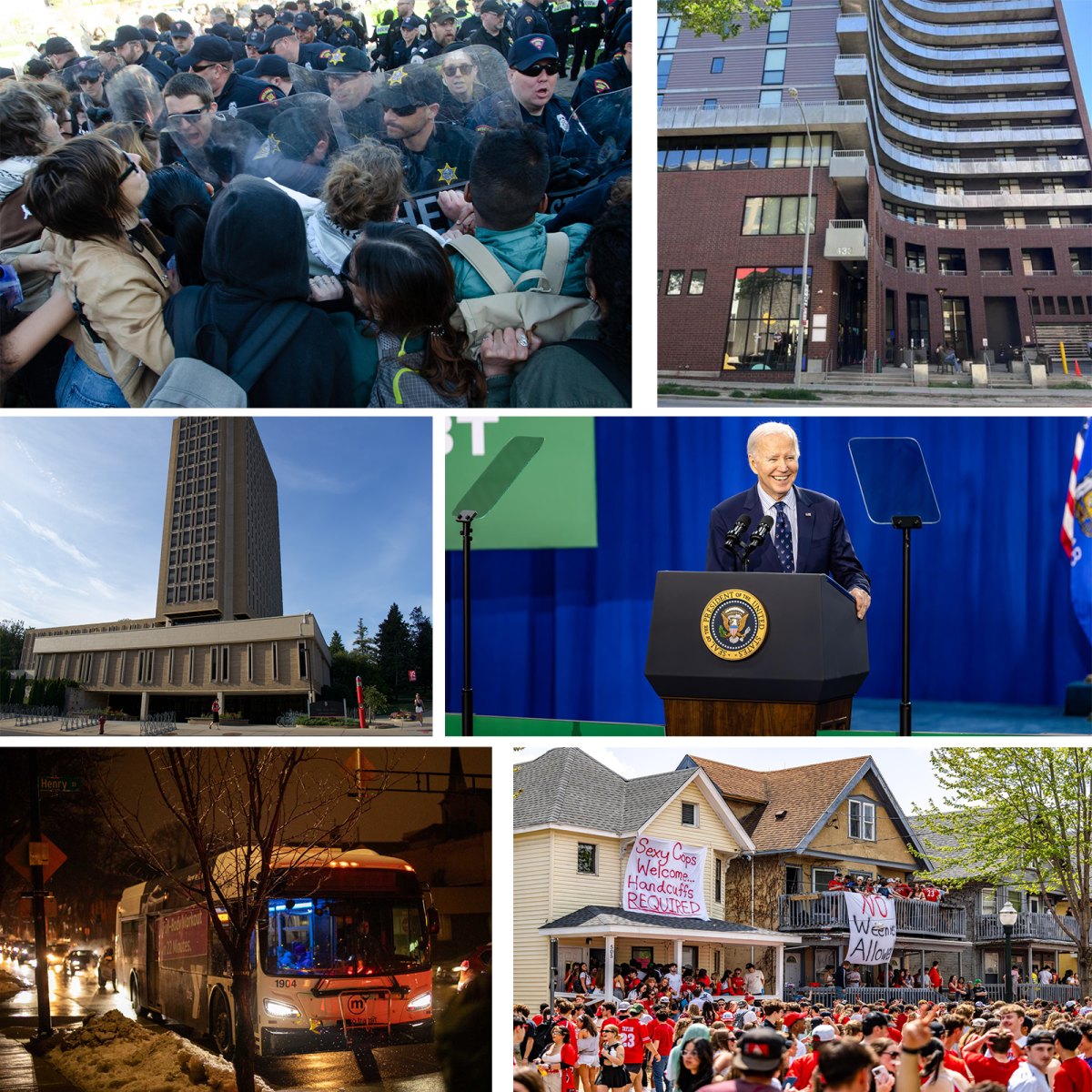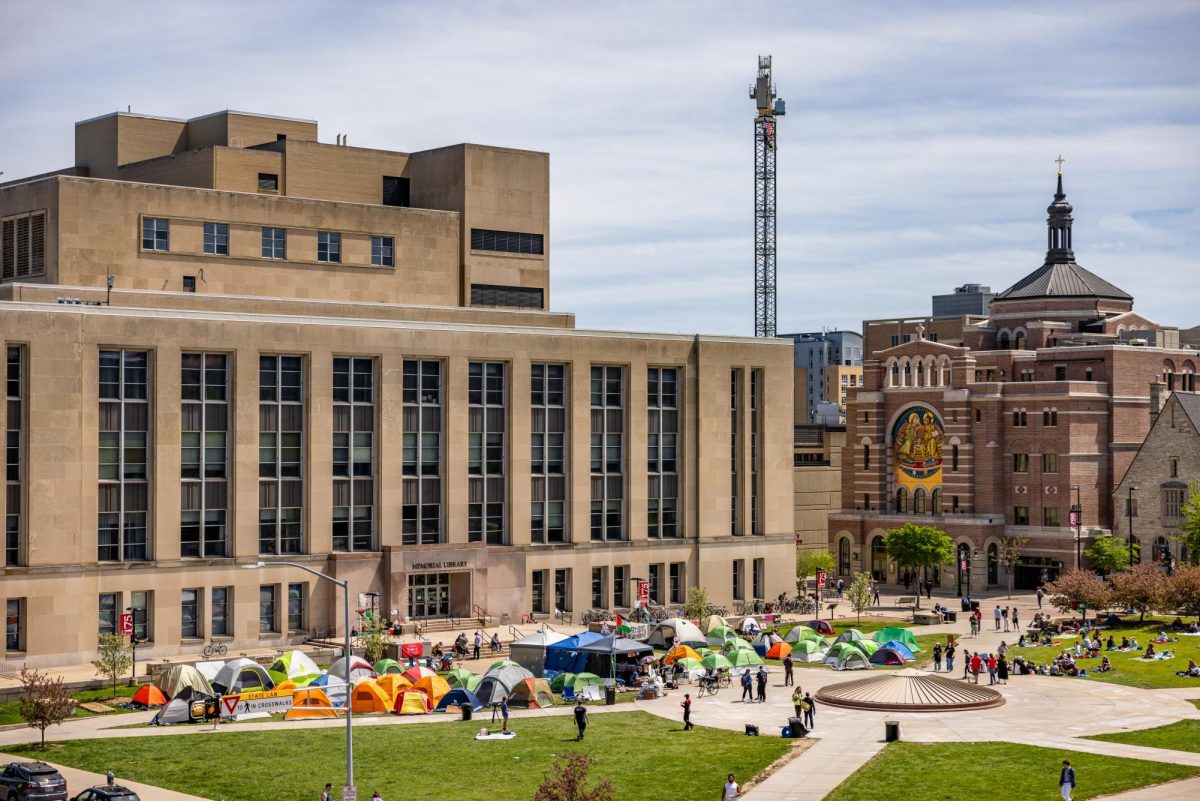Wisconsin is undoubtedly one of the most fervently contested states on the electoral map in 2020.
Both the Trump and Biden campaigns understand the importance of either retaining or winning back Wisconsin, as massive amounts of money are flooding into the state. Wisconsin currently ranks 6th in the nation for weekly combined media purchases between the two campaigns.
Wisconsin’s role in President Donald Trump’s demolition of the Democrats’ “blue wall” in 2016 proved crucial in securing the White House for arguably the most insurgent presidential candidate in modern history. Even in a normal election cycle, Wisconsin would be front and center in the minds of voters and political operatives, as FiveThirtyEight gave Wisconsin a 13.6% chance of being the tipping point state in 2020 as of Oct. 19.
But this is not a normal election cycle.
Over the past year, COVID-19 has ravaged the United States, and Wisconsin hasn’t contained the spread well. The state’s seven-day average for both reported cases and deaths has spiked well above the peak reached in July and August. This reality has forced organizing efforts on the University of Wisconsin campus to turn virtual as organizers fervently attempt to reach voters without in-person canvassing or voter registration.
All of this is taking place in an arena wholly foreign to those operating within it because the pandemic presents fresh challenges even to seasoned organizers.
With just weeks to go before what many see as the most important election in modern American history, in what is largely considered one of the most important swing states on the map, campus political organizations are working tirelessly to make any impact they can.
Shifting Tactics
As organizations like Badgers for Biden seek to mobilize student voters for the Democratic ticket, they increasingly rely on collaborative efforts with other progressive and Democratic student organizations, as well as the Democratic Party of Wisconsin, without in-person events.
Badgers for Biden Chair Paige Leiser detailed how these collaboration efforts have formed the basis of their organizational efforts leading up to the election.
“The Young Progressives and the WisDems have a very large database of volunteers they can pull from,” Leiser said. “We’re the only campus, I think, in the United States, that has organizing interns [who] are specifically devoted to our campus. I have two campus organizers that I work with pretty much everyday that are with the [Democratic Party of Wisconsin].”
This close coordination with other student-based political organizers and party operatives at the state level has amplified the reach of Badgers for Biden and associated action groups.
Virtual electioneering provides the opportunity for any student to make an impact on their campus. Effectively, this allows Badgers for Biden to cast a wider net than they otherwise would have been able to.
“Especially because we’re catering almost entirely to students, it has been helpful in that we can get volunteers from wherever they are if they’re students at UW,” Leiser said. “I have many people [who] call in every week from their homes. So, they’re not even in the Madison area, but they’re students who are interested in volunteering.”
In some cases, this interconnectedness provided by the unique circumstances political organizations on campus currently face has transcended electoral politics. Students who hold primarily ideological, rather than partisan, motivations have also seized the moment to organize in a manner facilitated by the challenges they face.
Young Progressives Vice President Jack Connors touched on how the last few months of division and crisis have united various youth-based coalitions.
“The murder of George Floyd, Breonna Taylor, and others over the summer demonstrated the fact that focusing on electoral politics alone is an inadequate framework for tackling racism,” Connors said. “With that in mind, we’ve worked closely with a broad coalition of groups to hold both Democrats and Republicans accountable.”
While virtual political organization may provide opportunities for broad coalition building and the expansion of voter outreach beyond the UW campus, it does come with some challenges.
In the past, in-person canvassing and voter registration drives provided the bedrock for student outreach. College Democrats of UW-Madison Press Secretary Allyson Fergot said in-person events make relationship-building simpler, especially considering the complexities of registering first-time student voters and requesting an absentee ballot to safely cast a vote before Election Day.
“When we’re in person, I think you get a lot better connections with people … Especially when it comes to things like voter registration or requesting an absentee ballot, I think it’s a lot easier if you’re in-person to show someone the step-by-step of how to do it,” Fergot said.
To make up for this deficit, the College Democrats and their affiliated groups are holding regular weekends of action during which they have seen dozens of volunteers signing up for multiple hours-long shifts each with a full schedule of texts and phone calls to make.
The College Republicans of UW-Madison are also engaging in fervent phone banking efforts, even offering up a $40 incentive for one hour of phone banking as part of their campaign to win the #MAGAMadness nationwide phone banking tournament between other College Republican chapters. Both the UW-Madison College Republicans and the Madison chapter of Turning Point USA did not respond to requests for comment.
Though the method of delivery for student political organizations drastically changed just months before the election, the content has remained largely the same. Registering students to vote, for example, is the continued focus for Democratic-leaning campus groups seeking to increase voter turnout come Election Day.
But, as it has with nearly all aspects of the campaign, COVID-19 presents distinct challenges that have disrupted the normal resources for getting students to register.
Fighting Student Barriers
Of particular concern to Democratic activists is the fact that in states that track the party affiliation of registered voters, Republicans are narrowing the gap in key swing states. According to CBS News, Republicans have netted more registered voters than Democrats since 2016 in Pennsylvania, Florida and Arizona.
While Wisconsin does not account for party affiliation among registered voters, its total number of registered voters shrunk by thousands as large numbers of individuals have been purged from official voter rolls. This reality has incentivized a renewed focus on registering student voters for campus organizers.
On top of the already-salient concern of motivating students to register, the shutdown of UW’s campus in early September created a distinct sense of urgency for Badgers for Biden and the DPW.
“When the shutdown for two weeks occurred at the beginning of the semester, I noticed a rapid change in messaging that we were getting from the DPW as well as just the general mentality within my group,” Leiser said.
No longer did they focus on Biden himself. Rather, the DPW pushed for student voter registration at all costs.
Knowing that mobilizing student voters would be crucial to a Democratic victory in Wisconsin, especially given the unique opportunity for young voters to shape the election in a swing state with razor-thin margins, their messaging shifted accordingly.
“[We] completely shift[ed] from ‘let’s talk about Joe Biden and let’s make sure that Joe Biden wins the presidency’ to ‘okay, we need to ensure that all of the messaging we are sending out pertains to getting people registered to vote and preparing people to head to the polls,’” Leiser said.
The lack of in-person voter registration drives put on by political organizing groups on campus was always going to add yet another challenge in the fight to get students to the polls. But the unique circumstances brought on by the pandemic simply piles on top of existing roadblocks to student participation in the electoral system.
As Kathy Cramer, the Natalie C. Holton chair of Letters and Science at UW and expert on student civic engagement, explains, there are significant hoops that students in particular often must jump through in order to become registered to vote.
“Uncertainty and lack of information make it harder for anyone to vote, regardless of their age. But young voters are often voting for the first time, so these things become bigger obstacles. There is just a lot to figure out for the first time,” Cramer said. “The voter ID is an extra obstacle for young people because they are among the groups of people — along with people of color and the elderly — who are disproportionately less likely to have a valid voter ID.”
Voter registration efforts have even expanded outside traditional political organizing, as groups such as Galvanize the Greeks and the Badgers Vote Coalition are also waging campaigns to drive student-voter turnout.
Getting students registered to vote is undoubtedly the focus of both political and non-partisan organizations seeking to amplify the electoral voice of UW’s student body. Having the capacity to act, however, is only one piece of the puzzle. Students also must feel confident that when push comes to shove, their vote is going to be counted and their voice will be heard.
A House of Cards
COVID-19 does more than just disrupt the plans of those seeking to galvanize student engagement in November’s election — it disrupts the election itself. Both organizing efforts and voting methods have been forced to rapidly adapt to our current pandemic environment.
Primarily, this change in the conduction of elections has resulted in a shift toward absentee voting either by mail or through in-person drop off sites. These efforts did not go unnoticed and certainly did not remain free from partisan challenges.
Trump has repeatedly questioned the legitimacy and reliability of mail-in ballots. He’s claimed mail-in ballots cause increased voter fraud and even threatened to sue states that send out absentee ballot applications to registered voters.
But undermining the validity of the preferred voting method of millions of Americans certainly doesn’t help an already waning trust in civic institutions, Cramer said.
“Trust in most public institutions, particularly the federal government, has been on the decline since polling data was first collected on these attitudes in the 1950s. According to the Pew Research Center, we have seen a decline in trust in the government in Washington among Millennials since 2015. It is too soon to know whether the attacks on the validity of absentee ballots have undermined public faith in our electoral systems, but it is safe to say that it very likely has not fostered trust in those systems,” Cramer said.
Democratic organizers on campus continue to push students to vote absentee to protect both themselves and the campus community at large.
“We are pushing the absentee ballot just because we believe that we trust voting by mail. Voter fraud by mail is extremely, extremely rare. So we’re pushing for it,” Fergot said. “But, if they can’t vote until the Election Day, voting in general is just more important than not voting, so however they do it, we’re just encouraging in general. There have been recent attacks from the GOP on voting by mail, but we’re just going to keep encouraging voting by mail and absentee voting. We trust our post office.”
Amid these concerns, the City of Madison has introduced efforts to ease the voting process for all residents, students included. Through events like Democracy in the Park, where individuals can register to vote or drop off their absentee ballots in Madison’s public parks, Madison is working to make voting as smooth as possible.
Efforts like these will help handle the inevitable flood of absentee ballots expected to come Nov. 3.
“We sent out about 10 times more [ballots] than we normally send out,” Jim Verbick of the Madison City Clerk’s office said. “We sent out just over 100,000 ballots, and we’ve received about 64,000 back already.”
Events like Democracy in the Park played a large role in this process, as City of Madison workers collected roughly 10,800 and 6,500 ballots in the first and second weeks of the event, respectively.
A rapid increase in people signing up to work the polls this election cycle also demonstrated this explosion in electoral participation. During April’s primary elections, Wisconsin struggled with a poll worker deficit. Long lines and closed polling locations throughout Wisconsin, especially in Milwaukee, made voting in the primary distinctly more difficult than past elections. Recently, Madison residents have stepped up to the plate to fill the gap caused by concerns over COVID-19.
“For Election Day, we normally have about 3,000 , but now we have over 6,000 workers signed up,” Verbick said.
No matter how UW’s student body casts their ballot over the next couple of weeks, they are poised to have more say in the future of our nation than any other student population in the nation. According to research conducted by Tufts University, Wisconsin is the state in which the youth vote, particularly 18-29-year-olds, will have the greatest impact on the state’s electoral choices. In fact, the upper Midwest as a whole is a “powerhouse of youth potential.”
This potential to have youth voters shape the future of the nation is undoubtedly one of the driving factors behind the rampant efforts of political organizations to reach out to students by any means necessary. The methods may have changed, but the sense of urgency is stronger than ever.
In a time of global pandemic, social unrest and economic hardship, students are nonetheless working tirelessly to mobilize their peers and project their voice to the highest level of public authority.















